 |










Were this book just a brilliant thriller by Ben Macintyre or Alan Furst perhaps a happier ending could have been contrived. But this masterpiece is the work of Morris Wolff himself. Wolff's story of trying to free Wallenberg. So the outcome is dictated by history, not fiction. This is a true work of the soul written by a tenacious advocate: a testament to a truly wonderful person, as shown by excerpts from Raoul Wallenberg's own personal diary from June 1944.
Jim Magid
New York, NY

Buy The Book
|
Notable Characters
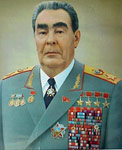
Brezhnev, Leonid
John Ehrlichman - “According to the CIA file, after Brezhnev detained Wallenberg at the 18th Red Army Headquarters in Debrecen, he drove back to Budapest that same day and broke into Wallenberg’s office. He cracked the safe open and with the help of two other men he stole all the gold, jewelry and diamonds he found inside, filling the pockets of his coat. These were valuables that the fleeing Hungarian Jews had entrusted to Wallenberg at his office. Wallenberg had put them in his large safe for safe keeping pending their return.”
|
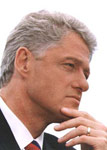
Clinton, William J.
“I always wanted to meet the lawyer who started that case,” President Clinton told Morris Wolff who was seated next to the President and First Lady Hillary Clinton. They discussed Wallenberg and the author's desire to have the President intervene with the Russians. Hillary, dressed in a dark pants suit with a white orchid, nudged me, “You now have access to the White House. We will re-open the matter through new diplomatic channels. We will see if he is still alive.”
Morris Wolff gives a unique account of Raoul Wallenberg, who saved tens of thousands of lives and became one of the true heroes of the 20th century. For nearly thirty years, Wolff has been unflagging in his efforts to uncover Wallenberg's fate, and this fascinating and personal book will inspire readers with a story that has captured its author's heart for decades.
WILLIAM J. CLINTON
PRESIDENT OF THE UNITED STATES
|
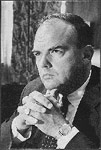
Ehrlichman, John
Morris Wolff - "When I first met him, I wasn’t sure what to expect. At the pinnacle of power, Ehrlichman had a reputation as a pompous and arrogant man. I marveled at how different he seemed now. He was calmer, less intense. Goateed, with a new career as an artist, he had come to terms with his past -- and could speak about it with detachment and refreshing honesty. The arrogance was gone and a softness and vulnerability had taken its place. He was likable, and seemed as if he wasn’t trying to impress anyone. Prison and time alone had changed him."
|

Eichman, Adolf
After all, it was Wallenberg who, only the month before, in December 1944, at a Shabbat dinner of legend, had persuaded Eichmann, through the sheer force of his indomitable Swedish will, to call off the planned massacre of the Budapest Jewish Ghetto, thus saving 30,000 lives in one stroke.
|
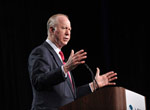
Gergen, David
Morris Wolff - "I asked the White House, through Chief Presidential assistant David Gergen, to get the State Department and the White House to file an amicus curiae—friend of the court—brief supporting my civil complaint. Gergen was enthusiastic and very supportive. He tried his level best, but his efforts were undercut and sabotaged by White House Counsels Fred Fielding and John G. Roberts."
|
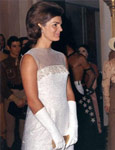
Kennedy, Jacqueline
“That looks like Jackie Kennedy,” he said.
The woman came closer. It certainly was. After her second husband Aristotle Onassis’ death, Jackie had settled in an apartment on 5th Avenue in New York, where she was now a book editor at Doubleday. My friend headed off to his office and I looked again at the woman approaching me on the curved asphalt path. She was now about 10 yards away. I decided it was time for my birthday gift. I moved in front of her. She stopped and looked up at me and smiled at my flirtatious behavior. She could have been a Mount Holyoke student, and I could have been an amorous Amherst College student. It was indeed Jackie Kennedy.
|
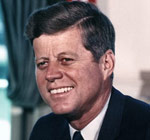
Kennedy, John F.
He looked out the window at the Rose Garden. “This is important work you are doing. How does it feel just being out of law school and doing important work, knowing that you might be guessing right or wrong on the choice of law, knowing that whatever you decide you will be involved in an historic debate and you will be walking in the corridors of history.” He smiled and sat down to rock in his rocking chair, relieving the awful pain in his back. He looked tired and gray, the pain making crow feet markings near his eyes. Maybe he had too much of his medication for Parkinson’s disease. The public only got to see the well tanned and robust John F. Kennedy. Sitting next to him on the couch next to the rocking chair, I could see him as he was; A man in constant pain as a result of his PT 109 boat injuries during World War II when he spent several hours in the water fighting off sharks and waiting to be rescued. This was a man who knew about the dilemma of rescue first hand. He was not feeling well but he soldiered on.
|

Kissinger, Henry
Morris Wolff - "In 1970, the U.S. State Department had a chance to retrieve Wallenberg in a swap for Soviet spies held in U.S. prisons. This responsibility was entrusted to Henry Kissinger and his staff. Nothing was done. There was no new inquiry and no trade. The American government at the time thought any efforts to confront the Soviets on the Wallenberg matter would be considered “an act of provocation.”
|
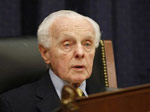
Lantos, Thomas
Morris Wolff - Wallenberg had indeed been declared a citizen of the United States by Act of Congress and by the President’s signature on August 5, 1981. Congressman Thomas Lantos of California, the sponsor of the bill---a man saved by Wallenberg as a sixteen year old in 1944 in Budapest who later migrated to the USA and got himself elected to Congress on a “save Raoul Wallenberg” platform ---made it very clear: “The reason we are passing this law today is to give an unequivocal legal basis for demanding and obtaining his freedom. This is now a matter of law."
|
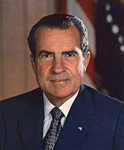
Nixon, Richard
Morris Wolff - "Nixon was asked by the Wallenberg family to ask Brezhnev to release Raoul. He told others he simply could not discuss the matter of Wallenberg’s release with Brezhnev, that it would be an embarrassment. Kissinger was out of the loop. The CIA had not briefed Henry Kissinger but the President had been fully informed that any mention of Wallenberg’s name and fate would be a source of deep embarrassment to Brezhnev."
|

Reagan, Ronald
Morris Wolff - "Reagan signed the bill into law on August 5, 1981 and stated: “This law must be used as a tool to pry this hero out of the hands of the Soviets, and to secure freedom for Raoul Wallenberg. I sign it with the hope and prayer that he will one day sit beneath the tree planted for his at Yad Vashem on the Avenue of the Righteous Gentiles in Jerusalem.” Reagan got mileage with the Jewish vote for this Rose Garden ceremony---a great actor at work, but little else."
|
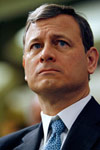
Roberts, John
Morris Wolff - I was in Geneva on international law business when I received a late afternoon phone call from E.J. Kessler, a journalist for the Jewish Forward.
“Morris, I am writing an article on Judge John G. Roberts, on the occasion of his nomination to the United States Supreme Court. I have uncovered some information at the Reagan Library in California about Roberts’s unusual involvement in the Wallenberg case and his role in the possible cover up of demanding release and rescue efforts, which you sought to achieve through President Reagan in November of 1983. I thought you might like to hear what I have uncovered. It is a story of scandal and misbehavior by our own government in your Wallenberg case,” he said.
|

The Dalai Lama
Morris Wolff - "The Dalai Lama was considering human rights litigation against China. He wanted my advice on how he might present a human rights claim on behalf of his people in from of the International Court of Justice at the Hague. He wanted to plead his own case to the World court. During our meeting, the Dalai Lama seemed to be smiling through the pain. His large horned rimmed glasses were perched at the end of his nose. Even though it was cold and snowing, he was just wearing his red and yellow Tibetan prayer robe and sandals. He just kept smiling, as he so often does, exuding a sense of bliss as if he had not a care in the world."
|

The Mossad
Morris Wolff - "I enlisted the Mossad in Israel on a dangerous rescue mission. I knew the head of the Mossad from my days of working for General Moshe Dayan in Israel in the summer of 1963. Both of our careers advanced over the next twenty-two years in separate countries. I was reintroduced to him in 1985 in Israel by my friend Mordecai Virshubsky, an important swing member of the Knesset. I presented my request in person to Moshe Dayan: “Please intervene with the Mossad. Ask them to help find our man and bring him home. Use the Entebbe strategy to go in, get him and get out.”
|
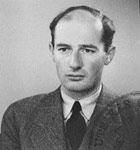
Wallenberg, Raoul
Raoul Wallenberg (1912-?) was one of the great heroes of World War II and one of the first victims of the Cold War. In 1944, as a Swedish diplomat in Budapest, he saved tens of thousands of Hungarian Jews from certain death. Taken into custody by the Russians at the beginning of 1945, he simply disappeared.
|
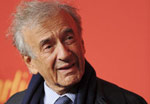
Wiesel, Elie
Morris Wolff - "In New York, I met twice with Nobel Prize winner Elie Wiesel, a survivor from Hungary and the author of “Night,” and other books on the Holocaust. Wiesel encouraged my lawsuit. He gave me good advice and told me his personal story of survival as tears moistened his cheeks. I was privileged to share time again with him in the month of March, 2011 when he and I were both awarded with the humanitarian service medal by Chapman University of Orange, California."
|
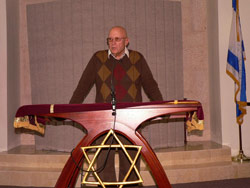
Wolff, Morris
On May 26, 2005 Morris was honored by the United States Congress for his pro bono legal work in seeking the release from Russian prison of Raoul Wallenberg, the Swedish diplomat who rescued more than 100,000 Jews of Budapest during World War II. At the ceremony, held in the House International Relations Committee room, the Hon. Jan Eliasson, Ambassador from Sweden to the United States and to the United Nations, stated: “The dedicated work of Morris Wolff in this creative effort to rescue diplomat Wallenberg stands as an inspiring example for young lawyers who seek justice and who are looking for a worthy cause worth fighting for in the future.”
View more information about the author of Whatever Happened to Raoul Wallenberg
|
|
|